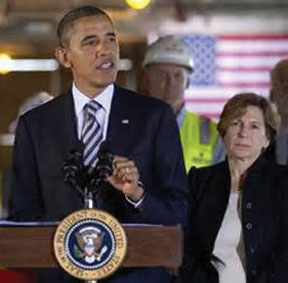 Obama Administration to grade teacher training
Obama Administration to grade teacher training
President Obama and Randi Weingarten, President of the American Federation of Teachers.
By Jazelle Hunt NNPA Washington Correspondent
WASHINGTON, D.C. (NNPA) – Teachers have always graded students. The Obama administration feels the time has come for someone to grade teachers.
Teacher training programs—from colleges and universities, to for-profit certification courses and non-profit preparatory programs—have few, if any, external evaluation systems to check for and improve quality. In fact, only five states (Tennessee, Ohio, North Carolina, Louisiana, and Florida) gather data on quality among their in-state programs.
“We have about 1,400 schools of education and hundreds and hundreds of alternative certification paths, and nobody in this country can tell anybody which one is more effective than the other,” said Department of Education Secretary Arne Duncan said when announcing the new federal initiative.
The Department of Education plans to build upon existing strategies, and guide every state to develop its own evaluation systems. The plan also intends to create a “feedback loop” by making the information gathered available to aspiring teachers, schools and districts, and the public.
Teachers beginning their careers feel especially ill-equipped.
Darryl Green worked as a salesman before coming a teacher in Baltimore County 16 years ago – and he is glad that he did.
“I was not prepared at all,” he recounted. “My content analysis was fine, but… entering the classroom setting is totally different than portrayed in the books. It was my first career that really helped me with my second. With sales you have to educate a person, then you can sell them on something. With teaching it’s the other way around.”
Green was not alone.
Newly-released data from the Department of Education show 62 percent of new teachers don’t feel prepared when they enter the field. Yet, 96 percent of teaching candidates pass their licensing exams.
And the students who suffer from teachers without proper training are the students who need the very best instructors.
“From my observation, it seems new teachers are placed in low-performing schools. Even if the school is not underperforming, new teachers are given classes with the most challenges,” said Adrian Layne, a veteran teacher in Kentucky’s Jefferson County Public School system. “Some teachers are not ready for the schools in which they are placed.”
Some, such as non-profit training program, Teach for America, welcome the federal intervention.
“We are very pleased that the administration is taking action to help us identify and learn from top-performing teacher-preparation programs,” said co-CEO Elisa Villanueva Beard. “We stand with our colleagues across the education community in our commitment to ensure that all teacher preparation programs are sup-ported in producing capable teachers for our nation’s children.”
Green also welcomes the pro-gram—but for different reasons.
“We most definitely need these standards. I’m seeing too many new teachers coming in at different levels, depending on what school they come from,” says Green, who was his school’s Teacher of the Year in 2012 and is preparing to earn a master of arts in teaching. “If the teachers don’t know what to expect, how can the students know what to expect?”
Randi Weingarten, president of the American Federation of Teachers, offered partial praise for the plan.
“We need a systemic approach to preparing teachers and a higher threshold to ensure that every teacher is ready to teach on his or her first day in the classroom,” Weingarten said. “This is what we’re looking for in any change to state or federal policy. Not a quick-fix, test-and-punish, market-based ranking of programs, but real solution-driven change that will support programs in pre-paring confident and competent teachers… but the devil is the details and we’ve got to get this right.”
Identifying those details—the factors that should be used to rate teaching programs—will be tricky.
Layne believes the measurements should consider basic statistics and demographic information, such as number of graduates who become teachers, but feels student performance should be off limits. .
Green believes that teacher performance should be one of the markers of program success; and that student performance, including standardized test scores, should be a part of that evaluation.
“Among other factors, yes; learning gains should be considered,” says Takirra Winfield, a senior media representative for Teach for America. “We must focus on increasing the diversity of our teacher candidates, especially in America’s highest need communities, to reflect the background and diversity of our students. Culturally-responsive teaching empowers our students and uses instruction that cuts across many disciplines and cultures to engage learners.”
The Department of Education 2015 budget proposal calls for more than $2.5 billion to cultivate effective teachers on a state level.
“There’s nothing wrong with trying to standardize, but I don’t think a thing like teacher training programs can be standardized,” Layne said. “I hope if they do this, that it will help the quality of teacher education to make sure every student is learning.”
